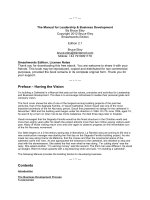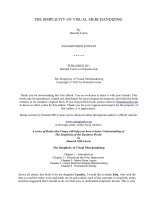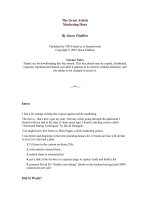MY BOOK ISN''''T SELLING THE CHARGAN BOOK OF MARKETING IDEAS by Philip Ragan ppt
Bạn đang xem bản rút gọn của tài liệu. Xem và tải ngay bản đầy đủ của tài liệu tại đây (87.58 KB, 9 trang )
MY BOOK ISN'T SELLING!
THE CHARGAN BOOK OF MARKETING IDEAS
by
Philip Ragan
****
PUBLISHED BY CHARGAN AT SMASHWORDS
This book available in print from
www.chargan.com
My Book Isn't Selling! The Chargan Book of Marketing Ideas
Copyright © 2010 Philip Ragan
All rights reserved. Without limiting the rights under copyright reserved above, no part of
this publication may be reproduced, stored in or introduced into a retrieval system, or
transmitted, in any form, or by any means (electronic, mechanical, photocopying, recording, or
otherwise) without the prior written permission of both the copyright owner and the above
publisher of this book.
The author acknowledges the trademarked status and trademark owners of various products
referenced in this work, which have been used without permission. The publication/use of these
trademarks is not authorized, associated with, or sponsored by the trademark owners.
Philip Ragan has asserted his right under the Copyright Act 1968 to be identified as the
author of this work.
Smashwords Edition License Notes
Thank you for downloading this free ebook. You are welcome to share it with your friends.
This book may be reproduced, copied and distributed for non-commercial purposes, provided the
book remains in its complete original form. If you enjoyed this book, please return to
Smashwords.com to discover other works by this author. Thank you for your support.
****
My Book Isn't Selling! The Chargan Book of Marketing Ideas
****
This book provides practical advice on how to market your book or ebook.
At Chargan My Book Publisher, we assist our authors by printing their local stock of books,
getting their paperback books for sale online at lulu
®
, wordclay
®
, amazon
®
and others, and we are
also a Smashwords
®
Affiliate, publishing their ebooks at Smashwords, for premium distribution
to all major ebook stores including the Apple iBook
®
store and the Amazon Kindle
®
store.
Details of our services are available at www.chargan.com or email us at
Some of the ideas that follow are our own, but many have been integrated from a number of
sources. When it comes to ebook marketing, in particular I'd like to acknowledge Mark Coker, of
Smashwords, and his book "The Smashwords Book Marketing Guide" which contains even more
ideas and can be downloaded for free (at the time of writing) from www.smashwords.com
Contents
The ebook revolution
The challenge for new authors
Don't annoy. Excite!
Curiosity is the key
Why isn't anyone buying my book?
Who do you know?
Your book online
Marketing your ebook
A web site
Paid advertising
In Summary
The ebook revolution
The book publishing world is changing fast in 2010. Only two years ago, in 2008, ebooks
represented less than 1% of all book sales, whereas today they represent 10% and rising.
Ebook readers, such as the Amazon Kindle, the Apple iPad
®
, the Sony Ereader
®
and the
Kobe
®
, have become the must-have accessory of 2010. Of course, once someone has purchased
an ebook reader, they want books on it, to read. Many free ebooks are available, as well as low
cost ebooks.
In October 2010, Amazon announced that sales of Kindle ebooks had way overtaken sales of
paper books on the Amazon website, by a factor of three! While many people say they prefer
paper books, the march of ebooks is continuing and it is not unreasonable to think that, by 2012,
more books will be sold as ebooks, than paper books.
The book world is in a position akin to the music world, when song downloading became
possible. Unfortunately the same piracy issues come up. Why pay $50 for a new hardback when
you can download it, legally, for $16, or pirate the ebook for free?
The challenge for new authors
First time authors face a whole new world of challenges.
First, the old fashioned book publishers are turning into dinosaurs. Defensive of their pitch,
they have little interest in taking on new authors under the old royalty system. If you are a new
author, dreaming of fame and fortune with a royalty contract from a major book publisher, dream
on.
Second, the explosion of new titles, and the ebook format, is reducing the price at which
books can be sold for. Don't expect to make much of a profit from your first book!
Third, expect to spend a long time building up a readership that follows your books, and keep
writing until you have a large selection of books for sale. Everyone who bought your past books
is a potential customer for your next book. So you keep building up your readership and
customer base.
As a new author, the world looks like this: you will spend money getting your precious first
work into print and available as an ebook. You will spend time marketing it, and getting known.
You will have to compete with thousands of other new and existing authors. Readers are getting
used to obtaining books for free, or at any rate, paying far less than they used to. Your first book
may have to be offered for free, or at low cost, if it is to get a readership. Only when you have
built up a readership following, and perhaps are on to your third or fourth book, will you be able
to charge a reasonable amount for your book, and start to dream of making a profit on book
sales.
So, dear new author, publish because you've spent years writing your book, and want to be
known as an author. Publish because you believe that there are people who will want to read your
book. Publish because you like the excitement and feeling of being an author. If you eventually
make a profit, or even a living, from your writing, then that will be cause for celebration, but
there is more to life than making money! Enjoy the satisfaction that comes with being an author,
and having all your friends and family knowing the fact. With a bit of luck and some marketing,
you will find the rewards that come from being an author.
Don't annoy. Excite!
Tell everyone you know, about your new book for sale!
But don't give copies away. It is tempting to start giving copies to all your best friends, in part
to just get copies out there, in part because of fear of rejection - you may suspect that they
wouldn't want to buy a copy.
So two things: deal with your fear of rejection, and start your own marketing campaign. If
they won't buy it, they won't read it either, in our experience.
One other thing: friends, if they do read it, will often come back to you with criticism of your
book. Don't take it to heart, unless you get the same comment from lots of people. Everyone will
figure they would have written the book differently, or written a different ending, or something.
Ignore them I say! This is your book, your style, your ending. If they want a different book, there
is nothing stopping them from writing their own book.
So you are going to tell everyone you know about your book?
The first rule is, don't annoy them. People hate friends putting the hard word on them, to buy
something. The softly-softly approach works better.
Make it known that you are excited about your book, that it is being published.
Print off some one-page flyers about your book, describing it, including details like the cost
and where to download the ebook if appropriate. You can give these to people, to arouse their
interest.
You send emails to people, don't you? Set up an email signature that advertises your book
and has a link to the download page.
If you mention it on Facebook or similar, don't blatantly sell it! Mention its existence, or
some great feedback you had, or something interesting you learned about ebooks etc. Make it
sound like a conversation and you are more likely to get interest in your book.
Curiosity is the key
Think "teaser".
If you give someone a précis of the entire story, or give away the plot or the very clever twist
to the story that you came up with, why will anyone then need to buy your book?
The one paragraph description of your book, written on the back page, or as a brief
description of your ebook, is the most valuable thing you are going to write. This will decide
whether or not someone will decide to buy your book, or pass it by.
If you do nothing else, get this right!
For starters, go to your favorite bookshop to browse existing books, or book descriptions
online. Find books on topics similar to yours. Which ones get you tempted to buy the book?
Make a note of how they are written and copy the format.
Who is in your audience? Who are the likely readers? You have to write a "teaser" in a style
that will appeal to them. If you've written a book on the Vietnam War, of interest to veterans,
then the writing style, and words used, will be very different to, say, a romance for teenage girls.
It is not the purpose to give away the whole book story, or to write a précis of it. The idea is
to convey enough understanding of the book or its story to leave the reader wanting to know
more.
Curiosity is the key!
If your "teaser" makes me curious to read more, then I'm half way to buying your book.
People like to read books by someone who is, subconsciously, just like themselves. It may be
hard for you to put yourself into their shoes. That is why, at Chargan, we sometimes find it easier
to write the "teaser" for you. Since we are once removed from your book, we can visualize what
would get people interested in your book.
Why isn't anyone buying my book?
The book market is fiercely competitive. With the advent of ebooks, thousands more titles are
available to read, at prices that are getting cheaper every day.
It's like the era of records and CD's (remember them?) giving way to mp3 files all over again,
but this time for books.
Has anyone heard of you?
Is your book available, and prominent, in ebook stores, on Amazon, or in your local
bookshops? Online, has your book been reviewed, or even purchased by anyone?
Have you figured out the profile of likely readers of your book? You need to know this, in
order to target the right readership for your book. No good marketing your Vietnam War epic to
teenage girls! Are you focusing on the right readership?
You are in competition
So you have your book printed. You have a local stock of books. It is available for purchase
as a paper book at Amazon.com and others. It is available as an ebook. You haven't sold one
copy.
What next?
Put yourself in the shoes of a reader looking for a book to buy. Will they come across your
book? We have listed some tips in the next sections on how to stand out from the competition.
Who do you know?
Tell people you know about your book. You probably know more people than you think.
Have a look at the list below and think about who you could contact. In some cases, contact or
emails may have to be made with consideration, or it may not be appropriate.
* Family
* Friends
* Work colleagues
* Club memberships
* Professional associations
* Any email lists you may have
* Facebook or MySpace contacts
* LinkedIn contacts
* Local clubs or special interest groups
* Church groups
* School contacts
* Local library
* Groups you could do a presentation to
* Web sites that you can post on (but beware looking like you are overtly selling)
* Your printed books at home
Your local stock of books can be advertised. Let all friends and family know they are
available for purchase. If it is a specialist topic, e.g. the Vietnam War, try contacting local veteran
and military history groups, for example. Offer to go along and speak on your topic, and have
copies available for purchase. If it's that kind of book, what about a local radio station or
newspaper? Can you get onto the station to talk about your book topic, or contribute an article to
the newspaper about it?
If you can do the above, then you may have some specialist local bookshops that would carry
your book, on a sale-or-return basis. If they know that you are getting on the radio for an
interview, for instance, and that you may mention your book is available at their bookstore, then
their interest in carrying your book may increase.
Your book online
What about Amazon and ebook stores?
People rarely browse "all" books and buy one at random.
First, have you written a good "teaser" as above, tempting them to buy it?
But of course, they have to get to a point where they can read your "teaser" first.
1. Category
Is your book listed under the right category? If it is a science fiction book and I search for
science fiction books, will it show up?
2. Tags
You can apply "tags" to your book. Here you try to anticipate all of the relevant search terms
that people might use, that could lead to your book. So if you've written a science fiction tale of
alien abduction, maybe you'll want to show up, when someone searches for "aliens", "alien
abduction", "crop circles", etc. The more tags the better.
3. Book Comments
Most sites have space for readers to write comments about the book. If your book has no
comments that implies that no-one has been interested in reading it. You don't want that! Get
some friends to log in and write comments about your book. Pre-feed them with suggested
comments, if you like. Try not to choose friends that will write rude things about your book! Get
half a dozen comments or more listed.
4. Best seller lists
People will browse best-seller lists. It's the old chicken-and-egg story here. How do you get
onto a best seller list when you haven't sold any?
Here is one way. If we are considering your ebook listing on Smashwords, for example, first
set your book price to "free". Then get in touch with all your friends and ask them to download
the book from the site. Ask them to contact their friends with the same request. It won't cost them
anything. After your download campaign is finished, you can reset the book price if you wish. If
you have enough friends, and this is done over a short targeted period, then your book may show
up in the best seller lists. Now you hope that this will drive enough readers to your book, for
them to consider buying it. See Mark Coker's book for more information on this topic.
5. Linking to popular books
Sites such as Smashwords and Amazon will analyze sales, and a book may be flagged as
"People who purchased this book also purchased the following books…"
So you have power, to be exercised by purchasing a few copies of your own book! For
example, if you purchase a best selling book, and your own book in the same transaction, you
increase the chances of getting the above marketing message working for you.
6. Your profile page
When we publish your ebook with Smashwords, you, as the author, get a personal web page
in which your details can be provided, including a listing of all your published books. If you
have produced several books, this can be useful to point readers to the balance of your books.
7. Your book page
Similarly, your book gets a web page to itself, in which the write-up can be extended, and a
copy of the Cover displayed, or anything else relevant.
8. YouTube
Consider making a short video about your book, and uploading it to YouTube. All publicity
helps!
9. Coupons
When your ebook is available on the Smashwords site, you can generate discount coupons
that offer a percentage off of the book price. Obviously, if your book is currently free, then
coupons don't apply, but otherwise you can email your friends with discount coupons, maybe
describe it as an "author special" or "mates rate" promotion. People like to think they are getting
something cheaper than normal.
10. Hyperlinks
Do you have access to web sites that could host a hyperlink to your book web page? Make
sure you have permission first, of course, and that the site is relevant, but it is helpful to get as
many hyperlinks to your book as possible.
Marketing your ebook
1. The power of "free"
So you've wondered down to your local bookstore and noted that most books of your type are
for sale at say $15. In pricing your ebook, you think, maybe knock a few dollars off and price it
at $12 for download.
But the problem is, none of your books have sold.
One obvious problem here is that your price is way too high. It's a competitive world for new
authors, and until your book is recognized, you should price it as cheaply as possible. Maybe
$2.99, or $1.99, or even $0.99, or how about offering it for free?
Offering your book for free may seem counter-intuitive when you are hoping to make money
from sales. But there is logic here. People are drawn to books that have already been downloaded
by lots of other people. At first, offering it for free encourages a lot of downloads. If that creates
ongoing interest, and you get plenty of unsolicited positive comments on your book, then later
you can start charging $0.99 and then increasing the price in small increments.
At that point in time, the theory is, better to sell 10,000 copies at $0.99 than 10 copies at
$9.99!
2. The sampling download percentage
When we at Chargan set up our ebook sales on the Smashwords site, we allow a free
download of a portion of the book, usually 10% to 20% of the book. The idea is that people can
start reading the first part of your book. If they like what they read, then they can purchase the
balance. This way, you get readers over the nervousness of buying a book about which they
know very little.
3. One book or many volumes?
How large is your book? If it's 200 pages or more, printed, then it might be too large as an
ebook. You will have already noticed that the popular ebooks sell for only a dollar or two.
The reaction of authors to that pricing has been to shrink the size of their books to match the
price, and many ebooks would only run to 50 pages if they were printed.
So take a fresh look at your own book. Could it be split into several volumes, in a logical
manner? Instead of one book of 200 pages, you could be the author of, say, three books, a trilogy.
Each book can sell for say one dollar, giving you three dollars revenue if someone eventually
buys all three. Or your book could become a series, volume 1, 2, etc.
As a bonus, you are now the author of several books. If we search on your name as an author,
it will show up that you have written several books, and authors of many books are much more
likely to achieve book sales!
4. Catch the eye - your Cover
What about the Cover design for your ebook?
In this different world, the Cover plays a new role. For a large print book, the Cover design is
important. But in the online world, readers will be viewing your Cover only as a small thumb
picture on screen, so expensive graphics are largely wasted.
Cover design is still important, however. In particular, pay attention to the color of the Cover.
A bright, striking color will draw the eye, so go for a bold color.
The rest of the design should still be a good design. A poor cover, with minimal artwork, or
spelling mistakes, or layout problems, will give the message that the rest of the book is no good.
Be sure that your Cover design is professionally presented, even if it is plain.
5. Book description - the "teaser"
We've talked about the single paragraph book description above, but emphasize that this is
one of the most important parts of your marketing. That one paragraph will largely decide
whether a reader buys your book or not.
Social Networking
Social networking is a way for people to indicate web sites, books, etc that they have found
interesting.
Facilities such as Xmarks, FaceBook, Twitter and Delicious all provide ways of voting on a
site or linking to it. If these terms mean nothing to you, then you need to start by looking at the
web site for each service (or ask your young kids if you have any!) to learn how they work.
Knowing how these work is useful to authors.
Consider setting up a FaceBook identity for you as author, or for your book, separate from
your personal FaceBook identity. This enables you to dedicate a FaceBook wall to your writing,
your ideas, and topical stuff related to your book. By getting people to become FaceBook
friends, you have a low-key way of regularly reminding them of your existence. It works best if
you don't overtly "sell" your book on this site, just write things that encourage interest and
curiosity.
A web site
You can set up your own web site devoted to your book, books or you as an author. This
involves some cost, of course, and is not as useful as might be thought, unless you are prepared
to spend a lot of money promoting the site.
The same question applies: why would anyone visit your web site, and how will they become
aware of it in the first place?
If you have started to get a following with a large number of readers, then that is an
appropriate time to consider the idea.
Paid advertising
Lastly, you can consider methods of paid advertising of your book, through adverts in media
such as:
Google Ads
Newspapers
Journals
In Summary
If it sounds like you, as the author, need to do a lot of work to promote your book, then you
are right! You are the person with the vested interest in getting your book read by people. It is a
competitive field, and you need to monitor your downloads, sales, and peoples comments
regularly, adjusting your marketing strategy to match.
If you haven't done all of the above, then you are not ready to move on to more expensive
methods of marketing. So our suggestion is, put the work in! Think of how much time you have
spent in writing your book. By comparison, the amount of time needed for marketing is not as
great, but it should be thought of as the second, essential, step in the writing of your book.
Best wishes for your life as an author!
Philip Ragan
Chargan My Book Publisher
mailto:?subject=Book marketing









